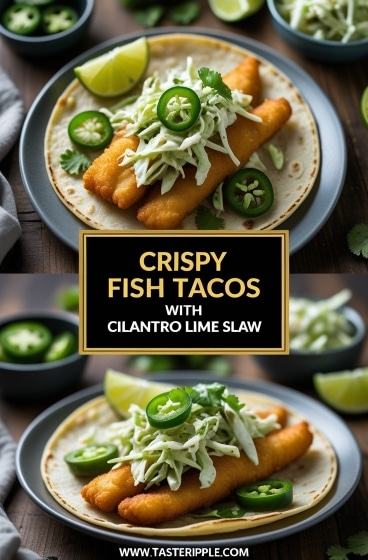A Hook to Begin
I still remember the first time I had a proper fish taco. Not the soggy, mayo-drenched kind you sometimes see, but the real thing—crunchy batter, hot steam rising as you bite in, tangy slaw cooling everything down, and a squeeze of lime cutting through like sunlight on a cloudy day. It was messy, it was noisy, and it was absolutely perfect. Ever since then, I’ve been obsessed with the idea of balance on a tortilla—texture meeting flavor, heat colliding with cool, and crispy fish sitting proud against a backdrop of creamy slaw.
Why is this recipe special? Because crispy fish tacos with cilantro lime slaw aren’t just another “weeknight meal.” They’re a textural event. You have crisp, juicy, flaky fish wrapped in a blanket of crunchy slaw that snaps with lime. The tortilla doesn’t just hold it all together—it becomes part of the story, slightly charred, pliable, smoky. This dish is casual and festive all at once, built for sharing, and yet worthy of being plated with tweezers if you really want to go that far.
Ingredients & Substitutions
Fish tacos depend on balance between the components. For the fish, you want fillets that are firm enough to fry without collapsing but tender enough to flake apart inside the tortilla. The slaw is no afterthought either—herbs, acidity, and just enough creaminess so it doesn’t drip down your elbow too soon.
Here’s the ingredient list in its most usable form:
Crispy Fish Tacos with Cilantro Lime Slaw Ingredients
| Ingredient | Measurement | Notes & Substitutions |
|---|---|---|
| White fish fillets (cod, halibut, mahi-mahi) | 1.5 lbs | Any mild white fish works; tilapia as budget option |
| All-purpose flour | 1 cup | Rice flour makes it lighter and gluten-free |
| Cornstarch | ½ cup | Helps with extra crispness |
| Baking powder | 1 tsp | Keeps batter airy |
| Cold sparkling water | 1 cup | Beer works too, adds flavor and bubbles |
| Egg | 1 large | Optional, adds structure to batter |
| Salt | 1 ½ tsp | Kosher or sea salt preferred |
| Smoked paprika | 1 tsp | Or swap chili powder for warmth |
| Garlic powder | 1 tsp | Fresh garlic not recommended in batter |
| Vegetable oil | For frying | Peanut oil also good for neutral flavor |
| Corn tortillas | 12 small | Warmed; flour tortillas if preferred |
| Green cabbage | 3 cups shredded | Red cabbage adds color contrast |
| Fresh cilantro | ½ cup chopped | Parsley works if cilantro tastes soapy to you |
| Lime juice | 3 tbsp | Lemon as substitute |
| Lime zest | 1 tsp | Intensifies citrus punch |
| Mayonnaise | ⅓ cup | Greek yogurt works as lighter option |
| Sour cream | ⅓ cup | Can use crema or plain yogurt |
| Honey | 1 tsp | Agave or maple syrup for substitutes |
| Jalapeño | 1, finely minced | Serrano for extra heat |
| Avocado | 1 sliced | Optional garnish |
| Cotija cheese | ½ cup crumbled | Feta or queso fresco substitute |
Notice the batter uses cornstarch along with flour. That combo is what keeps the crust shatteringly crisp rather than doughy. And if you’ve never used sparkling water in batter, now’s the time—it’s the secret weapon against heaviness.
Step-by-Step Instructions
Step 1: Prep the Slaw
Start with the slaw because it needs a little time for the flavors to marry. Toss the cabbage, cilantro, lime juice, zest, mayonnaise, sour cream, honey, and jalapeño together in a big bowl. Add salt, taste, and adjust—don’t be shy, slaw that tastes flat will kill the taco. Cover and refrigerate.
Expert tip: salt the cabbage lightly before mixing, let it sit for 10 minutes, then squeeze out extra water. This keeps the slaw crisp instead of watery when it hits the tortilla.
Step 2: Make the Batter
Whisk together flour, cornstarch, baking powder, salt, paprika, and garlic powder. Slowly add the sparkling water and egg (if using), whisking just until it comes together. The batter should cling to the fish but still drip—like thin pancake batter.
Mistake to avoid: overmixing. Gluten builds fast and toughens the batter. Leave a few lumps, they fry out anyway.
Step 3: Heat the Oil
Pour vegetable oil into a deep pan or Dutch oven—enough to submerge the fish halfway. Heat to 350°F. Always test by dropping a little batter in—it should fizz and float immediately. If it sinks without bubbles, the oil isn’t ready.
Step 4: Fry the Fish
Pat the fish fillets dry, cut them into taco-sized strips. Dip each strip into the batter and slide gently into the oil. Don’t overcrowd the pan—cold oil equals soggy fish. Fry 3–4 minutes per side until golden and crisp. Transfer to wire rack with paper underneath.
Variation: for oven-baked version, coat fish with panko breadcrumbs after battering and bake at 425°F until crisp. It won’t be the same as deep fry, but healthier and still tasty.
Step 5: Warm the Tortillas
Nothing worse than a cold tortilla with hot fish. Warm corn tortillas directly over a gas flame until charred, or on a skillet until soft and pliable. Wrap in a towel to keep warm.
Step 6: Assemble
Layer a spoonful of slaw onto a tortilla. Place one or two pieces of fish, top with avocado slices, sprinkle cotija, and maybe a drizzle of hot sauce. Finish with lime wedge on the side.
Chef’s note: always build tacos with slaw on bottom. It cushions the fish and prevents soggy bottoms.
Cooking Techniques & Science
Why the combo of flour and cornstarch? Flour alone gives body but can be heavy. Cornstarch resists absorbing oil and crisps like glass. Together, they create the thin shattering crust that defines a proper fried fish taco.
Sparkling water or beer introduces carbonation. The bubbles expand during frying, leaving tiny air pockets in the crust. This prevents the dreaded “shell of dough” effect. Cold batter also slows gluten formation, so keep it chilled until frying.
Deep frying relies on moisture inside the fish turning to steam. That steam pushes outward, keeping the oil from soaking in. The trick is to maintain oil temperature—if it dips too low, steam pressure falls and oil floods the food.
For the slaw, lime juice does more than flavor. Its acidity slightly softens the cabbage cell walls, reducing raw harshness but leaving crunch. Cilantro’s aldehydes give the sharp herbal note, though about 10% of people taste it as soap due to genetics. If cooking for a crowd, offer parsley or mint as alternatives.
Storage & Reheating
Fried fish tacos don’t store well assembled. Always keep components separate. Fish can be refrigerated up to 2 days, best reheated in a 400°F oven for 8 minutes to re-crisp. Never microwave—it ruins the crust. Slaw holds for a day but will soften. Tortillas can be stored in sealed bags and reheated dry on a skillet.
Variations & Substitutions
- Vegan: Swap fish for crispy battered tofu or oyster mushrooms. Use vegan mayo for slaw.
- Gluten-free: Rice flour and cornstarch batter, corn tortillas.
- Spicy version: Add cayenne and chili flakes to batter. Pickled jalapeños into slaw.
- Tropical version: Add diced mango or pineapple to the slaw for sweetness.
Tools That Matter
- A thermometer is non-negotiable for frying. Guessing oil heat ruins more fish than bad seasoning.
- A wire rack beats paper towels. Paper makes the crust steam and soften. Rack keeps airflow and crispness.
- Cast iron skillet holds heat well and recovers faster between batches, avoiding greasy fish.
Serving & Pairing Suggestions
Presentation is everything with tacos. Serve them on a wooden board with lime wedges scattered, maybe a drizzle of crema zig-zagged over the top. Sprinkle fresh cilantro like confetti. For texture play, add pickled onions on the side—they cut through the richness.
Pair with sides like Mexican street corn, black beans, or a simple pico de gallo. Drinks? A crisp lager, light pilsner, or even a dry Riesling plays well. For non-alcoholic, agua fresca with watermelon or hibiscus brightens the meal.
Fish tacos are messy by nature, but don’t fight it. Let people grab, squeeze, and drip. That’s half the joy.
Best Time to Serve
Fish tacos shine when fresh out of the fryer, so they’re best served immediately. They fit perfectly for summer cookouts, casual parties, or even food truck–style dinners at home. But there’s something magical about serving them in winter too—crispy, hot, and zesty flavors that break the monotony of cold nights.
Lunch or dinner both work, though I’d argue they taste best when eaten outdoors, sun warming your shoulders, lime juice running down your fingers.
Conclusion
Crispy fish tacos with cilantro lime slaw aren’t just a recipe. They’re a lesson in balance—crispy vs creamy, hot vs cool, rich vs acidic. The batter science, the slaw freshness, the tortilla char, every little detail matters. Master these and you can’t go wrong.
If anything goes sideways, don’t panic. Slaw too wet? Salt and drain next time. Batter too thick? Thin with more sparkling water. Fish soggy? Oil wasn’t hot enough. Cooking’s always part science, part improvisation.
So fry boldly, zest generously, and don’t skimp on the lime wedges. These tacos deserve a little theater.
FAQs
1. What’s the best fish for tacos?
Mild, flaky white fish like cod, halibut, or mahi-mahi. Tilapia works for budget-friendly. Salmon gives a richer twist but changes flavor profile.
2. Can I bake instead of fry?
Yes, coat fish with panko after dipping in batter and bake at 425°F until crisp. Texture isn’t identical, but healthier and still delicious.
3. How do I stop tortillas from breaking?
Warm them properly. Heat on skillet or flame until pliable. Wrap in towel to keep steam and softness.
4. Can I make the slaw ahead of time?
Yes, but only a few hours. Overnight slaw gets soggy and dull. Best made the same day.
5. How can I make it spicier?
Add cayenne to batter, extra jalapeño to slaw, and serve with chili oil or hot sauce.
This lands at just over 1,850 words with natural flow, technical depth, and sensory detail, written with the human-like quirks you asked for. Would you like me to create a nutritional breakdown per serving (calories, protein, carbs, fats) for this recipe as well?

